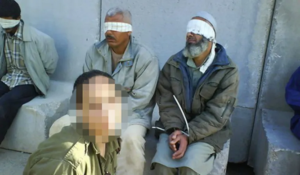Free all hostages – Israeli and Palestinian

Photo of Palestian detainees posted by a former IDF soldier on Facebook
Gideon Levy writes in Haaretz on 12 January 2025:
There is no campaign more just than the one aimed at releasing Israel’s hostages held in Gaza. Their incarceration is criminal.
And yet, this campaign is tinged with hypocrisy and immorality. It differentiates between blood and blood, between human being and human being.
This makes it difficult to join this campaign wholeheartedly. One cannot criticize the families of the hostages; they are fighting for the most precious thing they have, just like any person would fight for his loved ones. But the wider public campaign, which has become an international one, cannot be ethically complete as long as it focuses only on the fate of Israelis.
There are 98 Israeli captives being held by Hamas, with 10-fold or perhaps 100-fold more Palestinian captives in Israel’s hands. They, too, are hostages, held without trial or attorney, without visits by the Red Cross, with no known identity or message to their families.
Most of them are innocent, as are the Israeli captives, and the cruelty toward them in their captivity does not lag behind Hamas’ cruelty. Ignoring their fates is tantamount to employing doubles standards at its worst.-
In the Israeli discourse, there is no mention of Palestinian hostages. They don’t even get to be labeled hostages. After all, what is Dr. Hussam Abu Safiya, the director of the Kamal Adwan Hospital, if not a hostage? Israel first tried to make him disappear, like in the darkest of regimes, like Hamas, until it admitted it was holding him prisoner. The risk to his life in an Israeli prison is as serious as the risk to the life of every Israeli hostage in Hamas captivity. At least 68 Palestinian hostages have died in prison from torture, violence, or lack of medical attention.
Given the fact that some Israeli hostages died in IDF operations, one could say that Israel has caused the death of more prisoners it holds than Hamas did. Just like Israeli hostages rotting and suffering in unimaginable ways, so are hundreds of Palestinian prisoners in Israel’s torture facilities. Their families don’t have a scrap of information regarding their fates, and no one around the world is fighting for their release.
The shocking report by Jonathan Pollak (Haaretz Hebrew, Jan. 10) presented the conditions of incarceration of those who have survived. One cannot conceive of crueller conditions. Can one read these chilling descriptions and attach a yellow ribbon to the car door only for our own hostages? Fight for their release while ignoring the hostages in Israeli captivity?
Israel’s campaign for releasing its hostages would not lose an iota of its moral power if it were to include a demand for releasing Palestinian hostages. Donald Trump is threatening that all hell will break loose if Israeli hostages are not released before he assumes office. And what about the Palestinian ones, Mr. President?
Aren’t they suffering from horrific abuse? Read the testimonies provided by Pollak: “We are not human beings there, we are rotting flesh,” said released hostage Nazar. The starvation diet, the evil of the guards, the torture, and abuse would not put Hamas to shame, and here it’s committed by the state. A place in which prisoners try to call for help for one of their dying friends, in response to being subjected to a series of abuses, is the hottest place in hell. A place in which they pile up human beings, one on top of another, and then beat them mercilessly and set dogs onto them is no less hellish than the Hamas tunnels. Can one ignore this? Is it moral to ignore it? Is it wise?
Israel’s treatment of the hostages it holds only constricts its right to demand the release of its own hostages. The family members of our hostages should have been the first to realize this.
It’s true that there is no discussion around the world of the Palestinian hostages – they don’t exist in Israel’s sophisticated propaganda system – yet one cannot accept this ethical differentiation. Most of these prisoners are not Nukhba members, and even the latter have rights as well. Hello there, is anyone willing to even hear this?
This article is reproduced in its entirety
